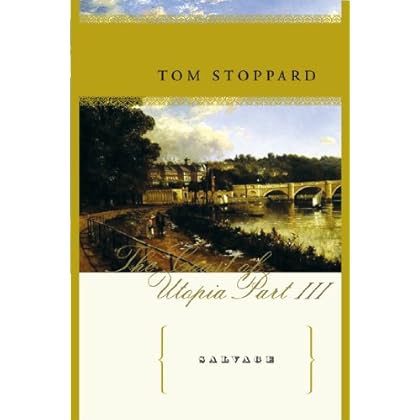Salvage: The Coast of Utopia, Part III (Tom Stoppard Book 3)
Category: Kindle Store,Kindle eBooks,Literature & Fiction
Salvage: The Coast of Utopia, Part III (Tom Stoppard Book 3) Details
Comprising of three sequential plays, The Coast of Utopia chronicles the story of romantics and revolutionaries caught up in a struggle for political freedom in an age of emperors.The Coast of Utopia is Tom Stoppard’s long-awaited and monumental trilogy that explores a group of friends who come of age under the Tsarist autocracy of Nicholas I, and for whom the term “intelligentsia” was coined. Among them are the anarchist Michael Bakunin, who was to challenge Marx for the soul of the masses; Ivan Turgenev, author of some of the most enduring works in Russian literature; the brilliant, erratic young critic Vissarion Belinsky; and Alexander Herzen, a nobleman's son and the first self-proclaimed socialist in Russia, who becomes the main focus of this drama of politics, love, loss and betrayal. In The Coast of Utopia, Stoppard presents an inspired examination of the struggle between romantic anarchy, utopian idealism and practical reformation in what The New York Times calls, “The biggest theatrical event of the year. . . . Brilliant, sprawling. . . . A rich pageant.”

Reviews
Tom Stoppard is arguably the single finest playwright of his generation, and the Coast of Utopia trilogy is a massive undertaking that in the hands of a less skilled author could have gone awry and badly. Stoppard though manages to make what could be a painfully pedantic history lesson into a moving portrayal of love, ideology, loss, and change.The mess of Alexander Herzen's life, and those of his closest friends and family, is tragic in a really monumental scope. There are no clear places to lay blame, nor clear winners or losers, instead the entire piece is pervaded with a sense of futility (and I don't mean this negatively), Herzen trying vainly to convince his associates that the blood being spilled is of no use, and trying to mend the broken relationships surrounding him.The history is neither dominate or secondary to the characterization here, rather Stoppard manages to make the historical events we know (or may not know) part and parcel of the volatile and fascinating lives of some of Russias greatest citizens.


